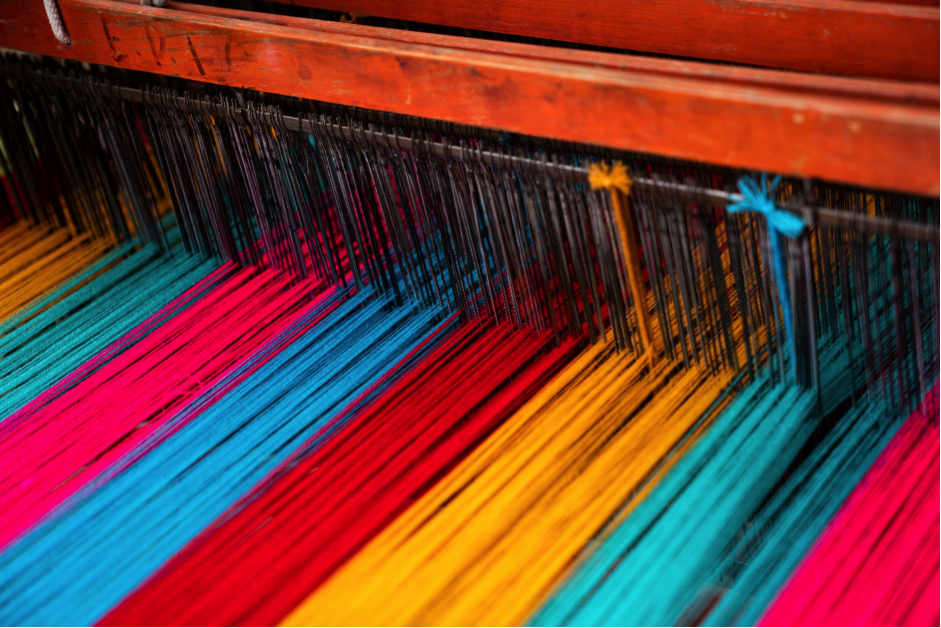18.3.20 The Weavers

For Ciarán and Johnny
Narrow though it may be, Latin literature nevertheless represents a kind of archive, keeping alive bodies of knowledge that are gradually being forgotten in certain parts of the world: the stars of the night sky, for instance, or the arts of spinning and weaving. Latin poetry is full of spinners and weavers, from the woman who ‘adds a night-shift to her day’s work’, weaving by firelight to keep her husband and children clothed (Virgil, Aeneid 8), to the magical Fates, who spin the yarns that represent individual human lives, and sing the future (Catullus, poem 64). And then there is Arachne, the low-born prodigy whose awesome skill provokes the wrath of Minerva:
A grace like Minerva’s, unearthly,
Moved her hands whether she bundled the fleeces
Or teased out the wool, like cirrus,
Or spun the yarn, or finally
Conjured her images into their places.
Challenged by Minerva to a weaving contest, Arachne’s effort is so beautiful that the goddess cannot handle being bested by this unashamed mortal. So she destroys Arachne, and then turns her into a spider, forced to weave her webs for the rest of time.
And neither the goddess
Nor jealously herself
Could find a stitch in the entire work
That was not perfection. Arachne’s triumph
Was unbearable.
I think that Ovid has something in common with Karl Marx here, in that he recognizes that before labour is something by which to earn a living, or something manipulated by the powers that be (a vengeful heaven in one case, a system of capitalist production in the other), it is first and foremost this amazing thing that human beings do, transforming raw materials into objects both beautiful and useful, adding value through effort and imagination. Arachne is a peasant who challenges a goddess, she is self-made and fearless, and so an inherent threat to authority. So fine is her work, Ovid says, that you would think her depictions were the real thing. And the poet is keenly aware, here and throughout his poem, of what unites the artist and the artisan, a relationship evidenced by the fact that our word poetry comes from the Greek verb poieō, to make or do. Arachne makes her tapestry, but Ovid makes Arachne.
Dublin too has had its weavers, ‘cotton, silk, woollen and linen weavers, concentrated in the overcrowded Coombe and Earl of Meath’s Liberty’, the city’s ‘largest occupational group’ at the end of the eighteenth century, working mainly from their homes and in poor conditions. Like Arachne, they too were often intolerant of unjust authority, marching down Pimlico to the Parliament in College Green to harry the politicians in the heady days of the 1790s, or helping in the revolutionary struggles that culminated in 1798 and 1803. Weaver’s Square is still there, if only in name, on Cork Street; look out for the plaque to Thomas Ellis at 65 Thomas St, the weaver who disappeared into Dublin Castle in the summer of 1798 and wasn’t seen again.
Things have been lost as well as gained on the journey to modern life. I can fly to Australia and keep the internet in my pocket, but I can’t produce my own food or make my own clothes. In this part of the world our clothes come from elsewhere, made as cheaply as possible and with little regard for the welfare or working conditions of the spinners and weavers of Bangladesh and Vietnam. In this part of the world, words like warp and weft and loom are fading from memory. Let me suggest to you that one of the points of the studying the arts – the ‘humanities’ as they are called – is to fight against this loss of memory, and the authority that loss of memory gives to the status quo. History is there to contextualize the present, to remind us that things were different once, and so could be different again. Remembering the weavers, ancient and modern, their work and their struggles to survive, becomes an act of co-ordination, grounding us more fully in the world. And as a mascot for this kind of humanities, one could do worse than Ovid’s Arachne, whose glittering designs bested Minerva herself, though at great personal cost.
Note: This post draws on Karl Marx’s Capital, Volume 1, first published in 1867, and E. P. Thompson’s The Making of the English Working Class, first published in 1963; it quotes from J. Smyth’s The Men of No Property: Radicals and Popular Politics in the Late Eighteenth Century (Gill and Macmillan, 1992). The translations from Ovid are from Ted Hughes’ Tales from Ovid (Faber and Faber, 1997) which, if you’re looking for a way in to the Metamorphoses, I can’t recommend highly enough.

